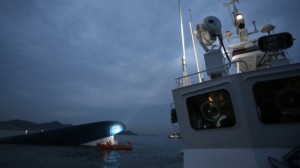Special to WorldTribune.com
By Donald Kirk, East-Asia-Intel.com
The seas were running quite high when I took a small ferry from Mokpo, a port city on South Korea’s southwestern coast, to the idyllic island of Jeju a month before the tragedy of the ferry boat that sank with 476 people on board, most of them students from a single high school near Seoul.

The agent who ticketed me at the Mokpo ferry terminal had to check to make sure the trip was on. After we had cleared the coastline and made our way beyond the protective shelter of the small islands where the Sewol would go down, the boat began to rock back and forth on the waves.
My greatest concern was seasickness, but my stomach remained under control while I wondered if the seas were a bit rough for the five-hour voyage. I could see why they sometimes cancel trips.
In retrospect, I should have been more concerned about the total absence of a safety drill. I do remember seeing some orange life jackets stowed somewhere, maybe under the seats, also stacked by a bulkhead, but there were no instructions on where to go or what do.
If there were life boats, I didn’t notice them. The three or four crew members whom I saw appeared nonchalant. At the snack counter to which I eventually staggered across a rolling deck, a pleasant young woman was purveying coffee and tea. If she had no reason to worry, why should I?
That seems to have been the spirit that pervaded all the coastal craft in the years before the Sewol tragedy. In the aftermath, President Park Geun-Hye has become the easy target for much of the blame.
No one is going to take seriously a diatribe from North Korea castigating her for what happened, but she’s under attack in the South for the flaws of a system that gives rise periodically, every few years, to horrific tragedies at a cost of hundreds of lives each time.
Yes, it’s ridiculous to hold Park responsible when the accident is so obviously a reflection of a society that appears in many ways to have modernized but remains mired in corruption and inefficiency that escapes much comment until disaster strikes.
For Park, the real test will be whether she and her ministers, advisers and aides can impose the discipline needed to instill order in projects and programs that often rely on mysterious networks of influence, friendships and payoffs.
The inner details of relationships among Korean power brokers are largely mysterious to most of us except when scandal propels a politician or tycoon into the news.
No doubt in the coming weeks and months we will learn a great deal more than has already been revealed in considerable detail about the inner workings of the company that owned the Sewol, but that’s a study in microcosm of much larger problems afflicting many organizations.
How much more will we really know about the construction companies that build apartment blocks that look like giant matchboxes from one end of the country to the other?
And who knows what goes on in the highway, subway and rail projects that bind Korean cities together in a system that superficially seems incredibly fast-moving and efficient?
What about the safety of the factories that churn out products competing for markets worldwide? All these activities, to the superficial eye, seem to work well, but do they really?
Payoffs to inspectors, to minor officials, to superiors are so widespread, no one can really be sure about issues of safety. The Sewol tragedy has taught us that lesson, as if we hadn’t already known.
The outpouring of grief over the Sewol, unlike memories of other disasters that cost more lives, will never go away. That’s because almost all the 302 victims were kids on a holiday cruise, and they died slow deaths from drowning after the captain and his crew had escaped.
The whole episode has earned a place in history books, but that doesn’t quite mean we’ve learned a lot from it.
The resignation of a prime minister is a ritual exercise that accomplishes little other than to divert blame from the president.
The trials of the captain of the ship and other crew members will no doubt produce much incriminating testimony but won’t mean a lot unless a coterie of company and government officials in cahoots with one another is also exposed.
And even then, what about the greater lesson of the abuses of privilege and authority and connections among friends and relatives?
If Korea appears as a modern country, old habits and practices remind us of the days, not so long ago, when Park’s father, Park Chung-hee, ruled the land and feudalism and authoritarianism, not democracy, were the hallmarks of Korean life.
Meanwhile, I’ve got to wonder if ferry rides to Jeju and other islands are somewhat safer now than when I took the boat from Mokpo to Jeju in March.
I would hope, next time, someone will be briefing us on what to do, however innocent those waters may appear.
Columnist Donald Kirk has spent much time in the region of the ferry disaster reporting and working on book projects. He’s at kirkdon@yahoo.com.

You must be logged in to post a comment Login